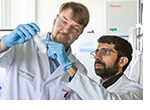CHEMISTRY
 SUSTAINABLE CHEMISTRY
SUSTAINABLE CHEMISTRYHow polymers and natural temperature variations serve to produce clean drinking water
Is there a way to obtain fresh water from seawater without employing conventional desalination techniques? A team led by Professor Sebastian Seiffert of the Department of Chemistry at JGU has developed a very promising approach to dealing with this important question. The HydroDeSal concept uses a hydrogel that reacts to changes in temperature. Once it gets cooler in the evening, the hydrogel draws water from the sea, already rejecting the salt, and then releases clean, salt-free drinking water during the day when temperatures rise. The application of this strategy is now to be made ready for the market.
 SUSTAINABLE CHEMISTRY
SUSTAINABLE CHEMISTRY"We need a thorough shake-up of our global energy industry"
Professor Carsten Streb and his team at the Department of Chemistry of Johannes Gutenberg University Mainz (JGU) have developed a molecule that is capable of storing solar energy and releasing it whenever required. Their pioneering work represents a possible solution to the worldwide energy crisis.
 BIOCHEMISTRY
BIOCHEMISTRYGiving more attention to neglected tropical diseases
More than one billion people worldwide suffer from devastating tropical illnesses that to date have been insufficiently researched. Biochemist Professor Ute Hellmich is exploring new ways in which these neglected diseases can be treated. Her research group employs a structural biological approach, concentrating on three closely-related parasites that causes Chagas disease, African sleeping sickness, and leishmaniasis.
